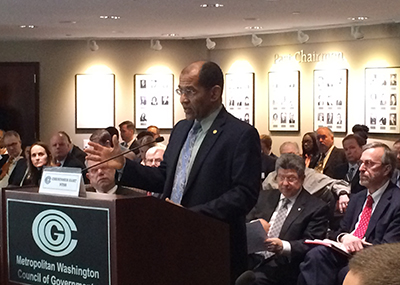
NTSB Acting Chairman Christopher Hart at COG Board of Directors
Washington, D.C. – The Acting Chairman of the National Transportation Safety Board (NTSB) today issued urgent recommendations at the monthly Board meeting of the Metropolitan Washington Council of Governments (COG) designed to improve the operation of tunnel ventilation systems in the Washington area’s transit system and transit agencies across the country.
In addition, the chairman of COG’s Fire Chiefs Committee outlined several agreements the committee has reached with the Washington Metropolitan Transit Authority (WMATA) designed to improve safety by more frequent testing of equipment, training of first responders and the rapid reporting and the timely repair of all systems.
As the forum for serious issues affecting the National Capital Region, COG convened officials at its February Board meeting to discuss the investigation of the January 12 smoke incident at the L’Enfant Plaza Metrorail station as well as emergency protocols.
“COG’s commitment as a result of this terrible accident is to work with WMATA, and the region’s fire officials and first responders to ensure that the cause of this accident is addressed in a timely fashion,” said Alexandria Mayor William Euille, who serves as COG Board Chairman. “We are also committed to working with those parties to ensure that improved planning and procedures are in place to prevent serious accidents and guarantee the strongest possible response when accidents occur.”
NTSB Acting Chairman Christopher Hart said the NTSB made the urgent recommendations because its investigation revealed that the Metrorail system’s tunnel ventilation fans malfunctioned during the incident. “Procedures for ventilation of smoke in emergencies can be critical, but they vary across systems, and in some systems are inadequate – as we have found in the present WMATA investigation,” Hart said. The NTSB recommended that WMATA address the issue immediately to prevent a chance of a recurrence, and recommended that other systems be audited for similar problems.
View NTSB’s urgent recommendations to WMATA.
Prince George’s County Fire Chief Marc Bashoor delivered a statement on behalf of the region’s fire chiefs noting their commitment to ensuring the safety of the public, first responders, and the WMATA employees within the Metro system at all times. “Safety will be enhanced with continued collaboration and focus on systemic improvements for the long term,” said Bashoor, who serves as Chairman of the COG Fire Chiefs Committee. He outlined eight steps that regional public safety officials have taken in the past 10 days, including agreeing to weekly testing of all underground radio systems in the District of Columbia and biweekly testing outside the District.
View the COG Fire Chiefs statement to Board of Directors.
COG has agreed, at the requests of Sens. Mark Warner, (D-VA) and Barbara Mikulski, (D-MD), to work with WMATA and the region’s first responders to ensure that testing and emergency protocols in the rail system are maintained so as to better ensure the safety of all the transit system’s customers.